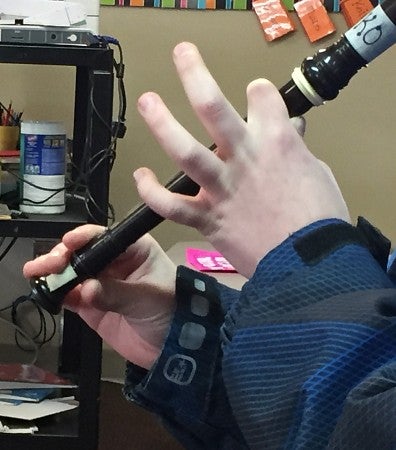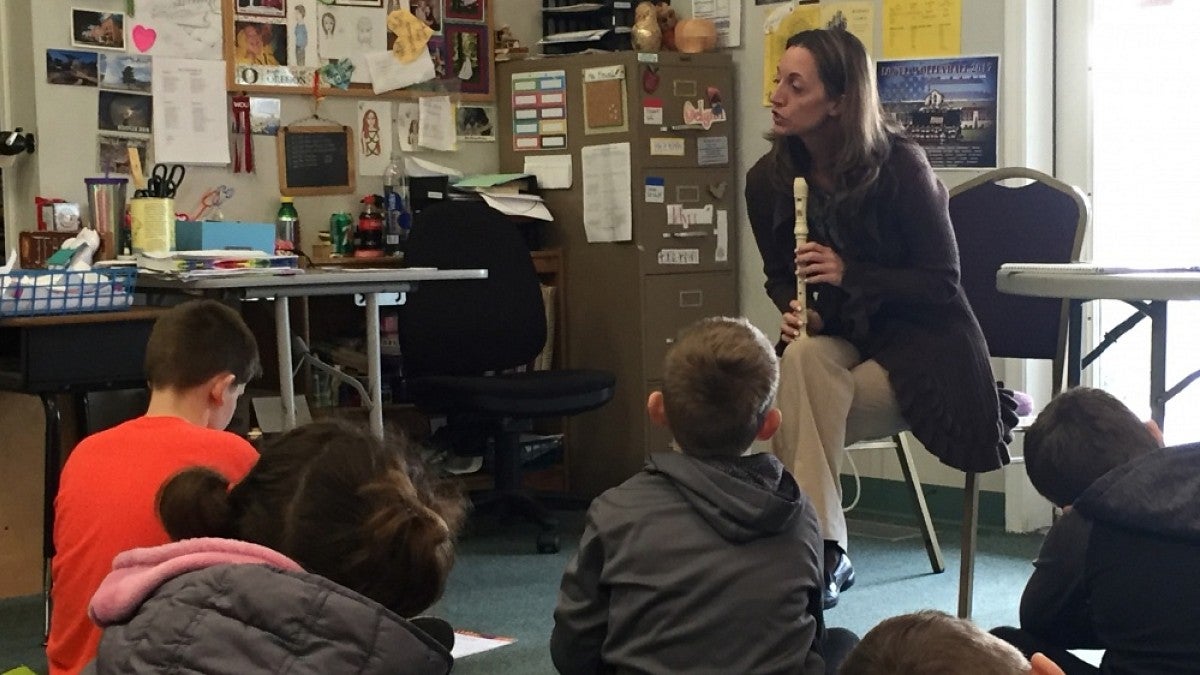Jasper Mountain, a treatment center for children with emotional issues, hoped that Beth Wheeler would come out and teach music once or twice a year. Wheeler, a UO instructor of music education, negotiated: She now volunteers at Jasper twice a week.
“If you can hear my voice, eyes on me,” Wheeler said to a group of 5- to 8-year-olds one Thursday morning. A few students snapped to attention, sitting “crisscross applesauce” on the carpet. Others continued to fidget and chatter.
“I’m looking for some students who are going to go with me to the symphony,” Wheeler said.

“We went last year when we didn’t have the music program, so all our kids did was sit and listen while all the other schools got to play along with their recorders,” said Amanda Goldbrand, a second- and third-grade teacher at Jasper Mountain. “This year the kids will actually get to go and perform, thanks to Dr. Beth, and they are extremely excited about that.”
Wheeler started volunteering at Jasper Mountain last fall. Her time at the facility has brought music to an often-overlooked population of children, giving them a new environment in which to explore and practice self-control. It has also inspired a potential research project.
Some of Jasper’s residents and day students were born with emotional and behavioral issues. Others developed them in response to abuse and neglect.
Wheeler explained that many children in abuse situations are reinforced to do nothing. If a child tries to take a book off a shelf or prepare something to eat, he or she may be abused for “making a mess.”
“And so when they get into a music classroom, oftentimes the students do not want to attempt any tasks for fear of retaliation or fear of doing something wrong and getting a negative response from their caregiver or somebody in authority,” she said. “So that’s one of the first things that we try to dissuade. This is a creative space, a place where you can try different musical tasks, and all answers are welcome at this point in time. All attempts are welcome.”
Wheeler’s older group, consisting of kids around the ages of 9 to 13, are learning to play “When the Saints Go Marching In” on their recorders. They have also learned a dance to the jazz standard “It Don't Mean a Thing (If It Ain't Got That Swing),” complete with Shorty Georges, Charlestons and jazz hands.
Dan Silver, a former Jasper Mountain residential director and treatment team member who still drops in periodically, considers Wheeler a rare find for the facility.
“If someone else who was less tuned in to special needs in kids would try to run the class, they would run into a ton of problems; but because of how she does it, it’s really wonderful,” Silver said. “When things start to get a little louder she gets quieter, or she’ll play a little song to really suck them in. She does little things that make them want to follow what’s going on and follow directions.”
Many guest instructors have trouble at Jasper Mountain. The students, Silver explained, sometimes act out in order to avoid participating in classes.
“They’ll become a problem so they can go outside and not be a part of it,” he said. “We don’t have that problem with Beth’s class. They all want to be a part of it.”
Wheeler hopes to start a research project looking at the effect of certain types of music instruction on the achievement motivation of students with severe emotional and behavioral disorders. Silver can see why.
“Giving the kids the chance to practice following directions and to practice self-control, and then tie that into something that’s musical kind of helps it engrain in the brain in a different way than just us asking them to follow directions,” Silver said. “They’re doing it now because they want to please the teacher and because they want to perfect something that they can then perform, which helps engrain all the things we’re working on in treatment in a deeper level.”
That’s not to say that it’s always easy. There are times when the students are difficult to control.
“We had one day where they were being extremely disrespectful and not following directions and just kind of being rude, and we had a big conversation about how Dr. Beth doesn’t have to come out here — she volunteers her time; she takes the time out of her day to come out here and teach you guys,” Goldbrand said.
Goldbrand and the other staff started taking instruments from the students who acted out, not allowing them to participate. The method, mixed with Wheeler’s own techniques, proved effective.
“If you would’ve seen them the first time that Dr. Beth came (compared) to now, it’s a huge difference. They are much better listeners and they are very involved,” Goldbrand said. “The kids really do respond well to her.”
Before Wheeler came to Jasper Mountain, the treatment center hadn’t had a music program in years.
“It’s something that has been meaningful to me, to help students of this population,” she said. “I know that many of my colleagues work within the community to try and enhance and better our community, and that’s one of the reasons why I wanted to continue this project, because we are here within a community of people. And the university can reach out to our community in a wide variety of ways, and this is one way that I can reach out.”
Wheeler brings stories from Jasper Mountain to her UO students. Her volunteerism also gives her graduate students the opportunity to observe a different music learning environment than they likely would otherwise.
“We don’t always think about these students because they’re not in a pre-K to 12 environment — because they would not be able to survive in that environment academically and socially — but they shouldn’t be forgotten because they’re part of our community,” Wheeler said. “And they are going to integrate back into our community once they receive some more coping mechanisms and are able to do that, and so I would say just don’t forget them.”
Near the end of the class, Wheeler’s older group stood up and sang “I Got Rhythm,” written by George and Ira Gershwin.
“I got rhythm, I got music, I got my friends
Who could ask for anything more?”
—By Sarah Eddy, University Communications


